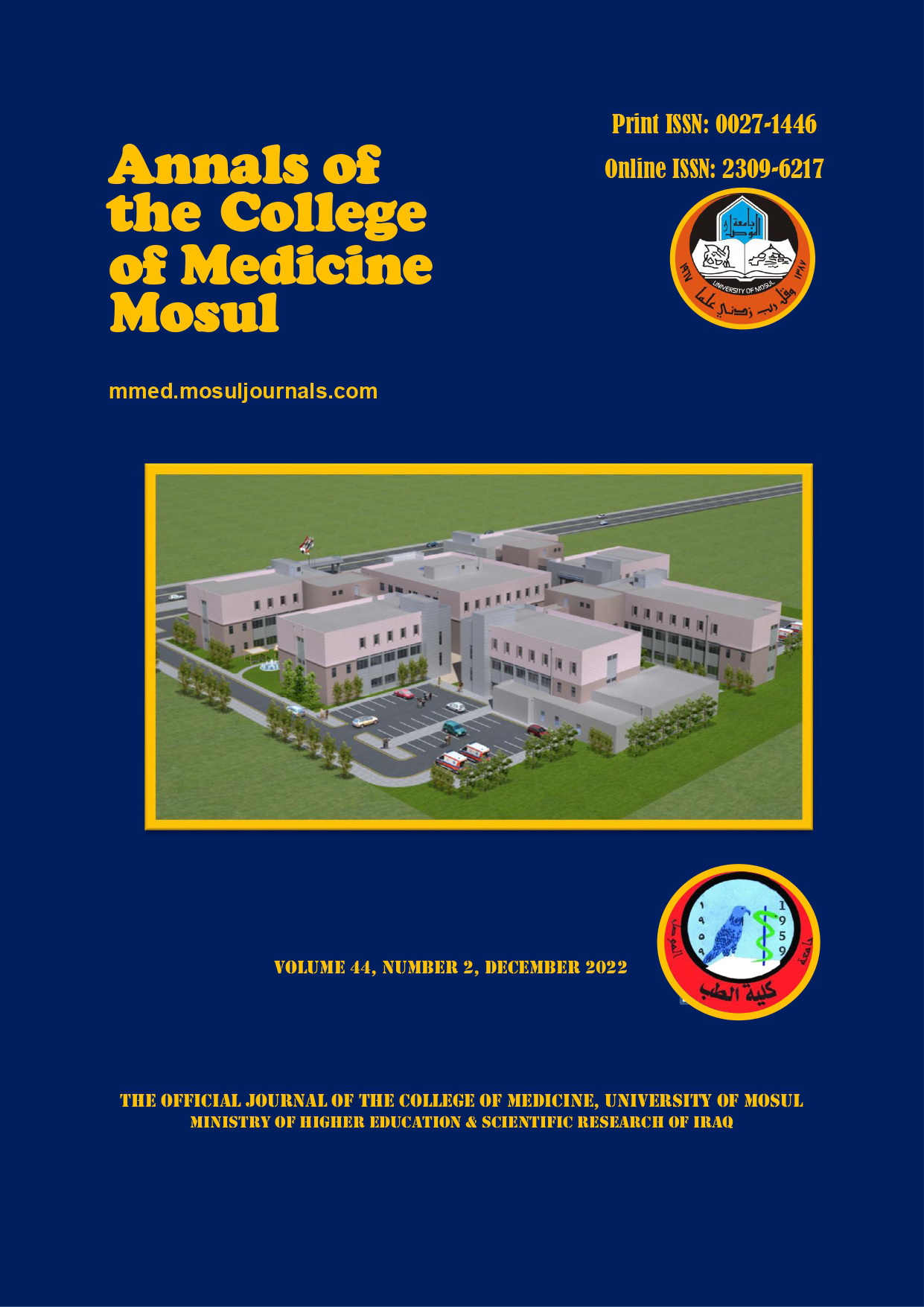Abstract
ABSTRACT
Objective: The aim of the study is to investigate medical students\\' attitudes and opinions regarding medical
ethics education.
Subjects and methods: The study was conducted in the College of Medicine, University of Mosul during the
academic year 2011-2012. A cross-sectional study design was adopted with a self-administered
questionnaire form distributed to medical students in the 5th and 6th undergraduate grades.
Results: Of 150 respondents, the majority (82%) considered medical ethics teaching for medical students an
important issue, and 69.3% agreed that medical ethics teaching would influence the attitudes and behaviors
of doctors, and improve patient-doctor relationship. However, only 40% had general interest in learning more
about medical ethics. Two thirds (64.8) of students were confident with their ability to recognize a significant
ethical problems in clinical practice. Only 36% knew how to proceed when a patient is mentally incompetent.
Conclusion: Medical students have a low positive attitude about the medical ethics teaching, and they may
not be adequately prepared to meet the challenges of clinical practice. There should be incorporation of
creative and integrated ethics curriculum to start in the first medical grade, with emphasis on ethical aspect
of daily medical practice.
Objective: The aim of the study is to investigate medical students\\' attitudes and opinions regarding medical
ethics education.
Subjects and methods: The study was conducted in the College of Medicine, University of Mosul during the
academic year 2011-2012. A cross-sectional study design was adopted with a self-administered
questionnaire form distributed to medical students in the 5th and 6th undergraduate grades.
Results: Of 150 respondents, the majority (82%) considered medical ethics teaching for medical students an
important issue, and 69.3% agreed that medical ethics teaching would influence the attitudes and behaviors
of doctors, and improve patient-doctor relationship. However, only 40% had general interest in learning more
about medical ethics. Two thirds (64.8) of students were confident with their ability to recognize a significant
ethical problems in clinical practice. Only 36% knew how to proceed when a patient is mentally incompetent.
Conclusion: Medical students have a low positive attitude about the medical ethics teaching, and they may
not be adequately prepared to meet the challenges of clinical practice. There should be incorporation of
creative and integrated ethics curriculum to start in the first medical grade, with emphasis on ethical aspect
of daily medical practice.
Abstract
الخلاصة
الخلاصة الهدف من الدراسة: تهدف الدراسة إلى التحري عن مواقف طلبة كلية الطب وآرائهم فيما يتعلق بدراسة أخلاقيات الطب. المواد وطرق العمل: أجريت الدراسة في كلية الطب, جامعة الموصل خلال العام الدراسي 2011-2012 بإعتماد تصميم دراسة المقطع العرضي، حيث تم إستخدام إستمارة الإستبيان الذاتي لجمع البيانات من طلبة كلية الطب-جامعة الموصل في المرحلتين الخامسة والسادسة. النتائج: من بين 150 طالب وطالبة مشاركين في الدراسة, إعتبرت الأغلبية (82%) إن تدريس أخلاقيات الطب لطلبة كلية الطب ناحية مهمة في التعليم الطبي, وإتفق 63,3% على أن تدريس هذه المادة سوف يؤثر على المواقف والسلوك ويحسن علاقة الطبيب مع مرضاه. بينما كان 40% فقط من الطلبة لديهم إهتمام عام هذا الموضوع. وظهر أن ثلثي الطلبة (64,8%) لديهم الثقة بقدرتهم على التعرف على مشاكل أخلاقية كبيرة في الممارسة السريرية, وعرف 36% فقط من الطلبة كيفية المضي قدما عندما يكون المريض غير مؤهل عقليا. الاستنتاجات: توصلت هذه الدراسة إلى أن طلبة كلية الطب كان لهم موقف أقل إيجابية حول تدريس أخلاقيات الطب وقد لايكونوا على إستعداد كاف لموجهة التحديات في الممارسة السريرية. أوصت الدراسة وجوب إدماج منهاج متكامل وإبداعي لأخلاقيات الطب منذ المرحلة الأولى مع التركيز على الجانب الأخلاقي في مجال الممارسة الطبية اليومية.
الخلاصة الهدف من الدراسة: تهدف الدراسة إلى التحري عن مواقف طلبة كلية الطب وآرائهم فيما يتعلق بدراسة أخلاقيات الطب. المواد وطرق العمل: أجريت الدراسة في كلية الطب, جامعة الموصل خلال العام الدراسي 2011-2012 بإعتماد تصميم دراسة المقطع العرضي، حيث تم إستخدام إستمارة الإستبيان الذاتي لجمع البيانات من طلبة كلية الطب-جامعة الموصل في المرحلتين الخامسة والسادسة. النتائج: من بين 150 طالب وطالبة مشاركين في الدراسة, إعتبرت الأغلبية (82%) إن تدريس أخلاقيات الطب لطلبة كلية الطب ناحية مهمة في التعليم الطبي, وإتفق 63,3% على أن تدريس هذه المادة سوف يؤثر على المواقف والسلوك ويحسن علاقة الطبيب مع مرضاه. بينما كان 40% فقط من الطلبة لديهم إهتمام عام هذا الموضوع. وظهر أن ثلثي الطلبة (64,8%) لديهم الثقة بقدرتهم على التعرف على مشاكل أخلاقية كبيرة في الممارسة السريرية, وعرف 36% فقط من الطلبة كيفية المضي قدما عندما يكون المريض غير مؤهل عقليا. الاستنتاجات: توصلت هذه الدراسة إلى أن طلبة كلية الطب كان لهم موقف أقل إيجابية حول تدريس أخلاقيات الطب وقد لايكونوا على إستعداد كاف لموجهة التحديات في الممارسة السريرية. أوصت الدراسة وجوب إدماج منهاج متكامل وإبداعي لأخلاقيات الطب منذ المرحلة الأولى مع التركيز على الجانب الأخلاقي في مجال الممارسة الطبية اليومية.
